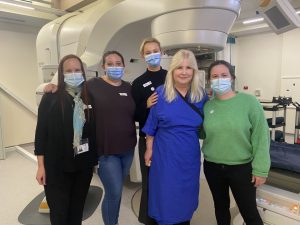Last Friday, 4 February, was World Cancer Day, and Alfred Health took the opportunity to profile some of the staff who work on the hospital’s world-leading clinical trials, more than half of which are cancer-related. These clinical trials make it possible to take cutting-edge treatments out of the lab and into clinical practice, like the new End Expiration Breath Hold method that combines surface guided radiation therapy with a breathing technique for more precise treatment of advanced cancers.
Elsewhere on the precinct, a new Monash study has challenged previously-held assumptions about the impact of testosterone on women’s hearts, and Baker scientists have published a study into the influence of genes on our gut health. As Australia continues to ‘live with COVID’, Burnet experts have joined calls for a rethink on how deaths from the virus are disclosed and maintain their focus on COVID vaccine support for countries in need.

Alfred Health has trialled a world-first treatment for stage four cancer that combines surface guided radiation with breath expiration.
Alfred Health
Remembering Black Saturday
Black Saturday was one of the worst bushfire disasters in Australian history, with 173 Victorians losing their life across over 400 individual fires.
Read more
World-first cancer treatment gives hope to Melbourne mum
A groundbreaking approach to treating stage four cancer has given new hope to some patients diagnosed with the life threatening disease.
Read more
Meet the team this World Cancer Day
Did you know that more than half of our 300 open trials are cancer-related trials? Our cancer clinical trials have allowed us to put new and cutting-edge treatment into clinical practice. They have also enabled us to recruit highly-engaged staff who are always looking to improve the way we deliver care.
Read more
Monash University – School of Public Health and Preventive Medicine
Low testosterone levels in women associated with double the risk of cardiac events
A study led by Women’s Health Research Program leader Prof Susan Davis has challenged the traditional view that testosterone is bad for women’s hearts, showing that for women aged over 70, having low testosterone levels actually doubles the risk of a cardiac event.
Read more
Baker Heart and Diabetes Institute
How our genes influence our gut health
A new study published today in Nature Genetics provides a powerful and comprehensive insight into the influence of our genes on our gut health and their role in shaping our gut microbiota.
Read more
Burnet Institute
OzSage urging rethink on COVID commentary
Independent expert body urges governments to act immediately to decrease the death rate from COVID-19, and for mortality data to be disclosed objectively in a context of respect.
Read more
New Country Director for Papua New Guinea
Burnet is pleased to announce three senior appointments to our program in Papua New Guinea including new Country Director, Dr Chani Kudakwashe.
Read more
Australia must go to ‘next level’ on vaccine support
Professor Brendan Crabb argues Australia needs to go to the ‘next level’ with its support for collaborations to deliver COVID-19 vaccines to countries in need.
Read more
